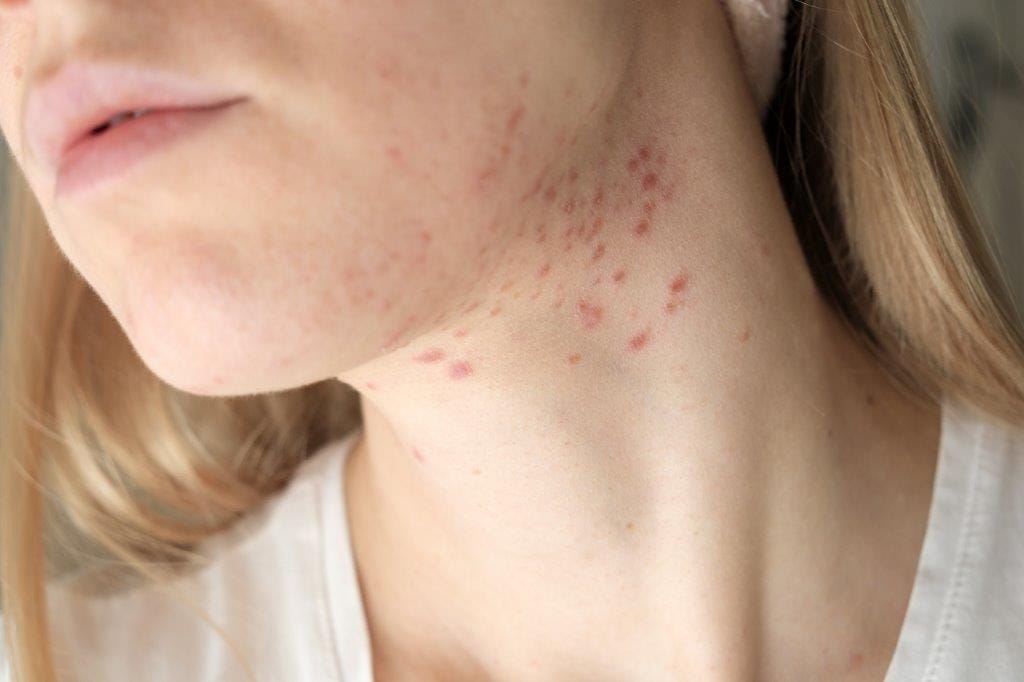
Hormonal acne is a type of acne that is primarily triggered by hormonal fluctuations in the body. It typically occurs when there is an imbalance in hormone levels, particularly androgens (male hormones) like testosterone. This hormonal imbalance can lead to an overproduction of sebum (skin oil) and an increased likelihood of clogged pores, which can result in acne breakouts.
Symptoms
What are the Symptoms of Hormonal Acne?
Characteristics of hormonal acne often include:
- Location: Hormonal acne tends to appear on the lower face, jawline, chin, and neck areas, although it can occur on other parts of the face and body as well. It often manifests as deep, painful, and cystic pimples or nodules beneath the skin’s surface.
- Fluctuations: Hormonal acne can flare up or worsen during certain times of the menstrual cycle in women, during pregnancy, perimenopause, or when there are hormonal disorders like polycystic ovary syndrome (PCOS).
- Persistent: It can be more persistent and less responsive to typical over-the-counter acne treatments. Because of its often severe and inflammatory nature, hormonal acne can sometimes result in scarring if not properly treated.
- Adult Onset: While acne is often associated with adolescence, hormonal acne can affect adults as well, especially women.
What are the causes of hormonal acne?
Hormonal acne is primarily caused by fluctuations in hormone levels. Some common causes include:
1. Puberty: Hormonal changes during adolescence can lead to increased oil production, leading to acne.
2. Menstrual Cycle: Hormonal shifts during the menstrual cycle can trigger acne in women.
3. Polycystic Ovary Syndrome (PCOS): This hormonal disorder can cause an excess of androgens (male hormones) in women, leading to acne.
4. Pregnancy: Hormonal changes during pregnancy can result in acne for some women.
5. Menopause: Hormonal fluctuations during menopause can also cause acne.
6. Stress: Stress can stimulate the release of hormones like cortisol, which can contribute to acne.
7. Certain Medications: Some medications, such as birth control pills and corticosteroids, can affect hormone levels and trigger acne.
8. Diet: While not a direct hormonal cause, studies suggest that diets high in refined sugar, dairy or high-glycaemic foods can worsen acne in some individuals.
9. Genetics: A family history of acne can increase the likelihood of developing hormonal acne.
10. Skincare and Makeup: Certain skincare or makeup products can clog pores and exacerbate acne, especially when combined with hormonal factors.
If you are wondering how to get rid of hormonal acne or how to treat hormonal acne, there are a number of ways our Naturopath/Homeopath/Nutritionist team at Morkare Natural Clinic can help with Hormonal Acne:
Our approach to treating hormonal acne at Morkare typically involves natural remedies such as herbs, supplements, homeopathic remedies, and diet and lifestyle modifications to address the underlying hormonal imbalances and promote overall skin health.
1. Dietary Changes: Emphasis on reducing dairy, sugar, and processed foods, which can contribute to inflammation and hormonal imbalances. A balanced diet rich in fruits, vegetables, and omega-3 fatty acids may be recommended.
2. Supplements: Supplements like zinc, omega-3 fatty acids, vitex (chasteberry), or DIM (diindolylmethane) can help to balance hormones and reduce inflammation.
3. Herbal Remedies: Certain herbs like Peony, Liquorice and Saw palmetto are believed to have anti-androgenic properties and may be recommended to regulate hormones.
4. Stress Management: Stress can exacerbate hormonal imbalances and acne. Stress-reduction techniques like meditation, yoga, or deep breathing exercises may be recommended. The importance of a healthy lifestyle, including regular exercise, adequate sleep, and proper hydration may also be advised.
5. Liver Support: Since the liver plays a role in hormone metabolism, we may recommend liver-supporting herbs or supplements to improve hormone clearance and a gentle detoxification protocols to eliminate toxins that could contribute to hormonal imbalances.
6. Balancing Gut Health: Addressing gut health through probiotics and a gut-friendly diet can sometimes have a positive impact on hormonal balance and acne.
7. Detoxification: Naturopaths may recommend gentle detoxification protocols to eliminate toxins that could contribute to hormonal imbalances.
8. Individualised Treatment: A key principle of natural medicine is personalised care. We will consider your unique health history and symptoms to tailor a treatment plan specifically for you.

